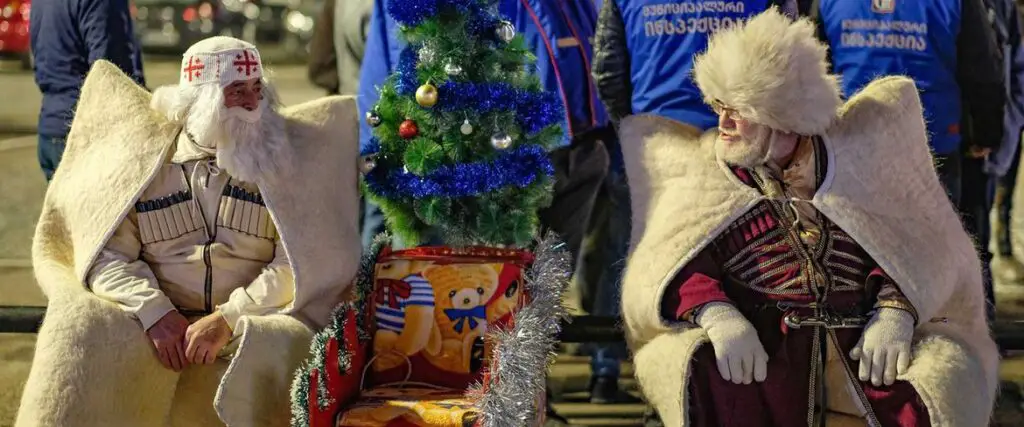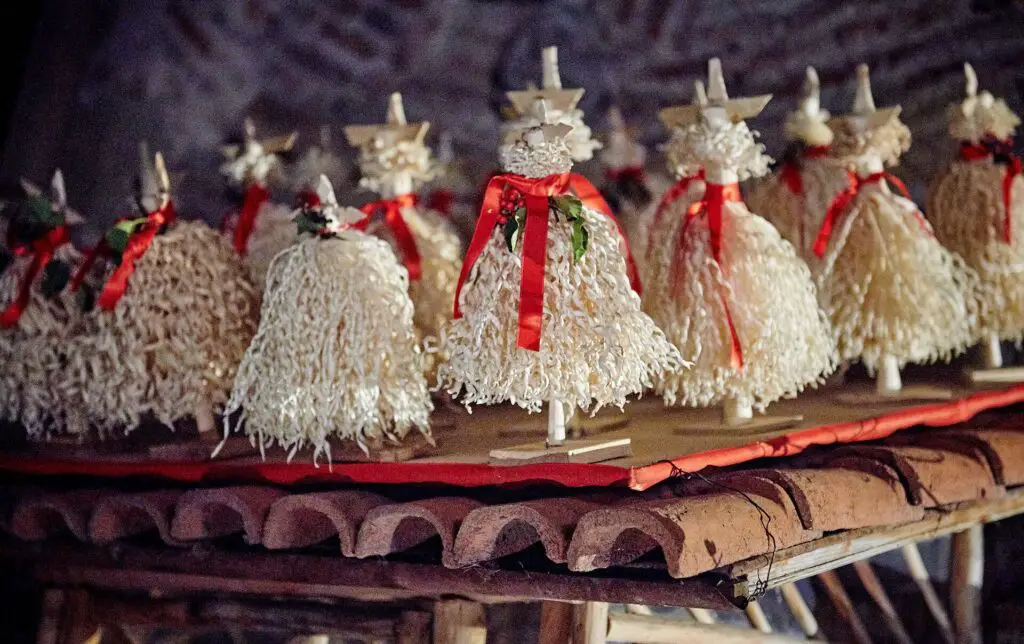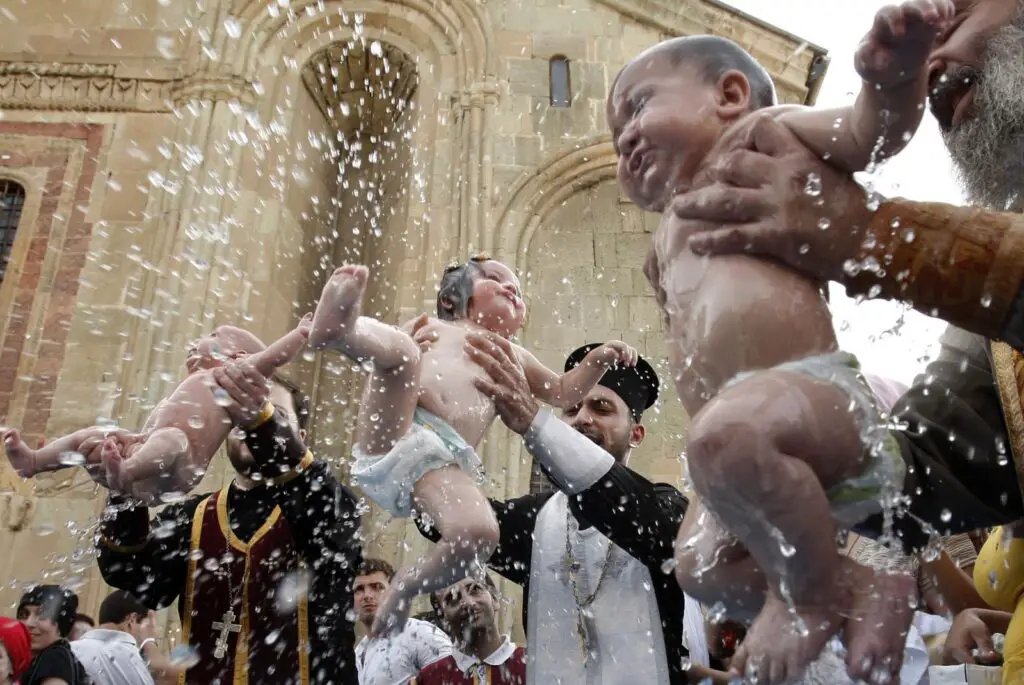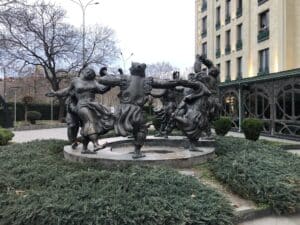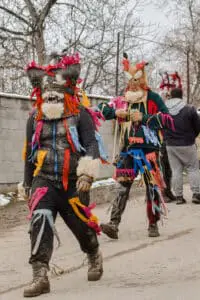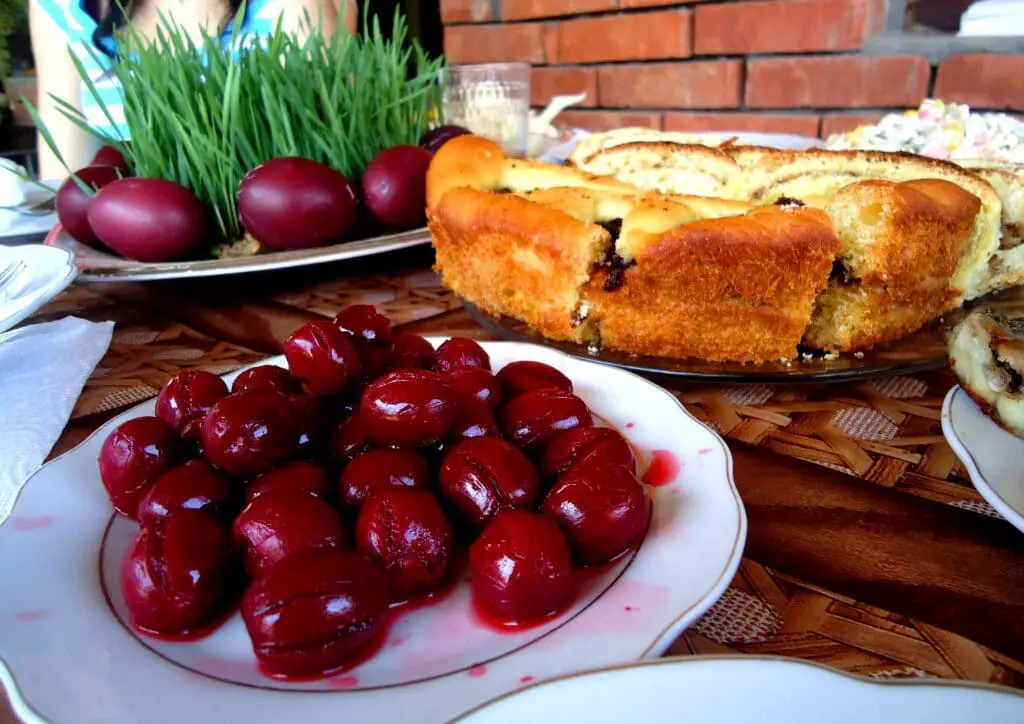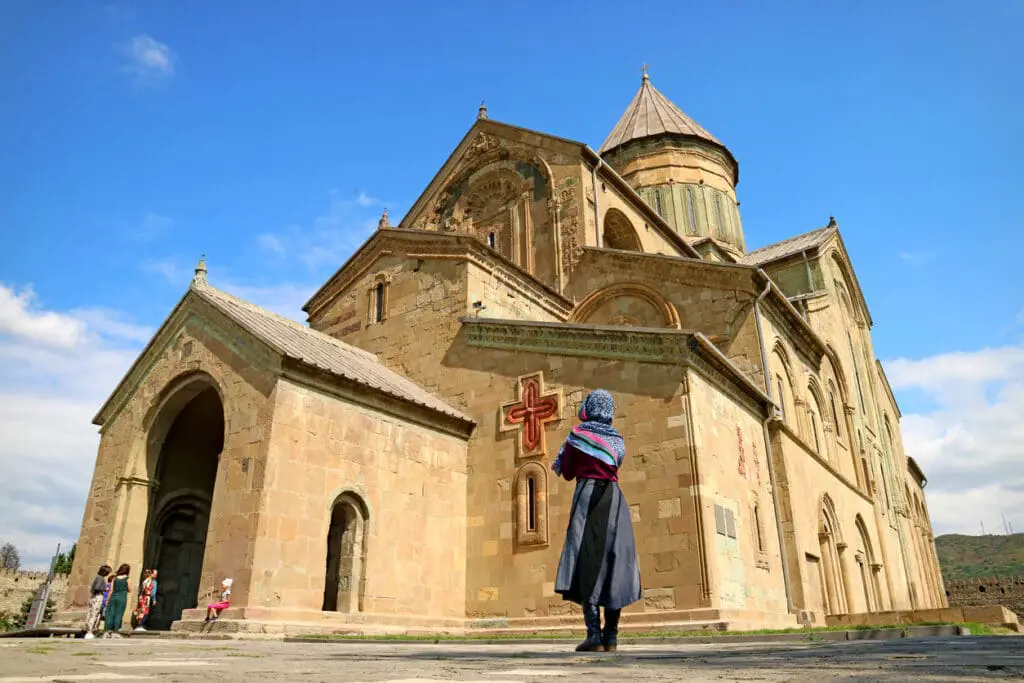Georgian holidays strongly reflect the country’s unique traditions and its demographics. First, as more than 80% of Georgians identify with the Georgian Orthodox Church, the strong influence of the church can be felt in the preponderance of Orthodox holidays. Georgia also has several holidays celebrating its statehood and independence, which have been hard-won. We can also see many fascinating ancient traditions, once suppressed under the USSR, reviving to popular acclaim. Many of these are regional celebrations, which additionally reflects the many cultures that make up the Georgian people.
Days Off
Long Weekends and Extra Days Off by Semester in 2026
| Spring | Summer | Fall | Winter |
| March 3, 8 April 9, 10-11 May 9, 12, 26 |
August 28 | October 14 November 23 |
January 1-2, 7, 19 |
New Year
In Georgian: ახალი წელი (akhali ts’eli)
January 1 – January 2, 2026
Public holiday
(days off: January 1 – January 2, 2026)
New Year’s Eve in Georgia takes up a special spot in the calendar. On the night of the 31st, crowds gather in brightly-lit streets and set off their own fireworks. Even in the capital city of Tbilisi, it is the people who put on their own displays, although things generally remain quite safe. Central squares will almost always have a Christmas tree-like structure in them.
On the night of the 31st, friends and family gather around a table for a magnificent supra – a traditional Georgian feast. In a New Year’s Eve supra the most common main dish is satsivi, a turkey stew cooked in walnut sauce. Amongst many other traditional delicacies, the most popular dessert is gozinaki, made of walnuts and honey. Dried fruits are also a must.
As throughout the former Soviet space, gifts may be given on New Year’s. However, the importance of gifts in Georgia takes a backseat to eating and enjoying the company around you. Even in families that practice the tradition of Tovlis Babua, a Georgian equivalent of Santa Claus, Tovlis Babua typically brings treats for the children and not gifts. Tovlis Babua, whose name translates to “Snow Grandfather,” is a mythical white-beared man in traditional Georgian dress and a white robe who lives high in the Caucasus Mountains.
On the first of January, each house should receive a dear guest, and preferably one who had good luck or success the year before. The “mekvle,” or first-foot, is a tradition still practiced by many in which the first guest who enters the house is believed to set the tone for the rest of the year. The second day of January, known as the “bedoba,” or “day of faith” is also important. If the day is spent quietly, your year shall be peaceful. For an active year, spend your day moving.
Georgians will not uncommonly spend the whole first week of the year visiting friends and relatives. In fact, the first three weeks of January are filled with important holidays (see below), which stretch the “New Year Holidays” into a long and joyous event.
Christmas (Orthodox)
In Georgian: შობა (shoba)
January 7, 2026
Public holiday
(day off: January 7, 2026)
Because most Orthodox holidays follow the Julian calendar, which differs from the Gregorian calendar used by most of the world, the dates of religious holidays can differ. Such is the case of Orthodox Christmas, or “shoba,” as it is locally known. Christmas Eve takes place on January 7th, because the two calendars currently differ by two weeks.
In Georgia, this special religious holiday has preserved ancient customs. For instance, the Georgian version of the Christmas tree is the “chichilaki” which has been nominated for UNESCO’s cultural heritage list. It consists of a dried hazelnut tree branch, shaved and formed into a distinctive “beard.” It is typically decorated with dried fruits, candy, and flowers. According to some, the beard is supposed to be reminiscent of the one worn by St. Basil, who visits Georgian children on Christmas, bearing presents.
Some people make their own chichilaki every year, but more often today it is made by semi-professionals who then sell them in holiday markets. The chichilaki is traditionally burned on Epiphany Day (see below).
Sometimes the chichilaki is set up in the home alongside a green New Year’s tree. However, many now use only the chichilaki. Georgia’s forests are legislatively protected and unregistered cut trees carry heavy fines. Many Geogians also argue that the chichilaki are more humane and sustainable – as they are made only from branches cut to improve the health of the living tree.
On Christmas Eve, it is customary to attend mass at midnight. After this service, families return to their homes and enjoy supra (a traditional Georgian feast) under candle lights. For many Georgians who rigorously follow Orthodox customs, this is the end of a 40 day fasting period and the beginning of two weeks of celebrations. A popular dish for this supra is satsivi, a poultry dish cooked in walnut sauce.
On Christmas Day morning, there is a caroling procession referred to as alilo. In the capital, Tbilisi, this is an exceptionally big part of Christmas celebrations. Families go out to the street, often in traditional dress, to sing old and new folk carols, some containing humorous lyrics. Children often dress up as angels and other religious figures. Alilo originated in the fifth century. After being officially banned by the Soviets, it was returned to the list of popular celebrations and is today again a cherished part of Georgian Orthodox Christmas.
Find out more about the alilo and chichilaki Christmas traditions with this article on our site.
Old New Year
In Georgian: ძველი ახალი წელი (dzveli akhali ts’eli)
January 14, 2026
(not a public holiday – no day off)
When the Soviets switched the USSR from the Julian to the Gregorian calendar, there was much debate amongst the Orthodox faithful about which calendar should be followed for holidays. Although New Year is not an Orthodox holiday, most Soviet citizens took advantage of the several day discrepancy between the two holidays to duplicate one of their favorite holidays: the New Year.
Today, Old New Year is common throughout the former Soviet Union and is celebrated with food, sometimes small gifts, and small family celebrations.
Orthodox Epiphany Day
In Georgian: ნათლისღების დღე (natlisghebis dghe)
January 19, 2026
Public holiday
(day off: January 19, 2026)
The Orthodox Church celebrates the Epiphany Day, also known as The Feast of Theophany, on January 19th. This date celebrates the baptism of Jesus in the river Jordan, and the day is considered to be ritually clean and holy. As a culture which honors Orthodox tradition, this is an important holiday in Georgia.
On this day, the chichilaki, or Georgian Christmas tree, is burned in a ritual meant to purify oneself from any bad luck accumulated over the past year.
Despite the cold, it is traditional to take an “Epiphany dip” outdoors on this day, which is thought to help purify the individual in body and spirit. In the city of Batumi, many gather on the beach at midnight to run into the Black Sea, which is blessed by the local Archbishop for the occasion. Hundreds gather for this ritual, and every year a large team of rescuers are mobilized in the area to ensure celebrations are carried out safely.
On this day, many children are also baptized – a couple’s third, forth or fifth child may be baptized by the Patriarch on this day. This tradition was started by the current patriarch to encourage Georgians to have larger families as the Georgian population is currently aging and shrinking.
This day should be spent with one’s godchildren and godparents, honoring the traditions of baptism and water purification of sins.
Mother’s Day
In Georgian: დედის დღე (dedis dghe)
March 3, 2026
Public holiday
(day off: March 3, 2026)
Mother’s day is celebrated on different dates in different countries. In Georgia, it is celebrated on March 3 of every year – a public holiday for all to appreciate. Georgia’s first president declared it a public holiday in 1991, and it has remained as such.
This is a day to promote appreciation for mothers’ roles in the family, and as such it is typical to offer flowers, jewelry, and similar gifts as symbols of love and respect.
When this holiday was first suggested, it was intended to replace International Women’s Day, which was regarded as a “soviet holiday” to be displaced by something more “western.” However, in the end, Mother’s Day was adopted and International Women’s Day kept, giving Georgia two very similar public holidays very near each other.
International Women’s Day
In Georgian: ქალთა საერთაშორისო დღე
(kalta saertashoriso dghe)
March 8, 2026
Public holiday
(day off: March 8, 2026)
International Women’s Day is celebrated on March 8th. This is a holiday entirely dedicated to women, filled with special gifts and courteous celebrations.
After the fragmentation of the USSR Georgia banned many Soviet holidays, International Women’s Day included. Instead women were celebrated on Mother’s Day – the 3rd of March. This became controversial as it seemed to overshadow single and childless women, and thus the holiday was reinstated.
It is customary for men to gift flowers to their mothers, grandmothers, sisters, wives, daughters, and any other important women in their lives. Other popular gifts include jewelry, chocolates, and letters of appreciation. It is a day to make women feel special and loved, hence men show gratefulness for all and any women in their lives.
As per tradition, holidays in Georgia are often sealed with a toast. For International Women’s Day, many opt to open their chacha – a traditional Georgian brandy saved for special occasions.
Berikaoba
In Georgian: ბერიკაობა (berik’aoba)
February 22, 2026
(not a public holiday – no day off – regional celebration)
Berikaoba is an ancient festival that was once celebrated throughout Georgia with regional variations. Today, it survives in the Kakheti region in Georgia’s east where celebrations can be found in Didi Chailuri and a small handful of other villages there.
Originating as a fertility ritual, Berikaoba marks the onset of spring and coincides with the beginning of Lent. The festival kicks off with bands of teenage boys — the so-called berikas — galloping through the streets in ferocious-looking masks, most of which are made from animal hides from sheep, ox, or goat, and decorated with pumpkin seeds, strips of cloth, and other materials. Door to door, the berikas collect offerings from the village residents, taking their fill of homemade wine, eggs, bread, and any other tithes the family wishes to offer in exchange for a fruitful spring. As the berikas make their way through the village, they let out loud yelps, whip the streets with switches, and give the occasional onlooker a swipe of mud for good luck — in ancient times this was believed to keep away evil spirits but today, it’s mostly in the name of tradition and good fun. Once the Berikas make their way through the village, it’s time for a few matches of chidaoba (Georgian wrestling) and plenty of tasty traditional Georgian delights like kada, pelamushi, and churchkhela.
Find out more about Berikaoba from this article on our site.
National Unity Day
In Georgian: ეროვნული ერთიანობის დღე
(erovnuli ertianobis dghe)
April 9, 2026
Public holiday
(day off: April 9, 2026)
The Day of National Unity in Georgia takes place on April 9th, and commemorates two important dates for Georgian independence. First, it remembers the Tbilisi massacre of April 9th, 1989 which was a violent crackdown on a peaceful protest opposing Soviet rule. It also marks the passing of the Georgian Declaration of Independence, which happened exactly two years later on April 9th, 1991.
Every year the families of the Tbilisi massacre victims gather by the Parliament Building in tribute. Many victims were young students who aspired to see a united, sovereign Georgia. After their deaths, the country entered a 40 day mourning period and workers all over the country began striking. It helped unite and motivate the country in their drive for independence.
Lelo Burti
In Georgian: ლელობურთი (leloburti)
April 12, 2026
(not a public holiday – no day off – regional celebration)
Lelo Burti is a brutal but long-standing tradition of western Georgia’s Guria region that takes place on Orthodox Easter. Every year the small village of Shukhuti draws visitors for an epic, village-wide sporting match that is fierce, full-contact, and not unlike a collective, wonderfully chaotic game of rugby.
The two “teams” are divvied up by the upper and lower portions of Shukhuti. It all begins once the local priest blesses the 30-some-odd pound ball that has been carefully made for the occasion. Of course, the objective is to get the ball to its respective goal, in the case of Lelo Burti, two streams mark the goals. Players normally number in the hundreds, resulting in a massive mosh that ebbs and flows throughout the village. Even spectators should be careful – although there is etiquette in the game meant to help prevent injury, there are no rules as such and the mosh can be dangerous as it pushes through the street that marks the playing field.
There are no limits to how long or short Lelo Burti can last — the brawl can persist for an hour or two or last all afternoon and well into the evening. Once a winner has placed the ball in the appropriate stream, the whole village takes the ball and ceremonial trophy to the local graveyard, where respects are paid to the ancestors of the village.
Orthodox Easter & Good Monday
In Georgian: აღდგომა (aghdgoma)
April 12, April 13, 2026
Public holiday
(days off: April 20-21, 2026)
Orthodox Easter celebrates the resurrection of Christ in accordance with the Julian Calendar. This holiday is traditionally celebrated with close family and after the completion of a 40 day fast starting on Clean Monday, and ending on Lazarus Saturday.
Preparations for Easter begin two weeks in advance when Georgians will set wheat seeds in moistened cotton or cloth. By Easter, the seeds should sprout into wheat grass. This is done in remembrance of the resurrection. (It is also similar to a Nowruz tradition that takes place at about the same time of year).
The Friday prior to Easter is Red Friday. On this day, eggs are dyed by boiling them with onion peels and ground madder root (a plant that has long been grown as a dye). This taints the eggshells a gleaming blood red, symbolizing the blood of Christ. Special eggy Easter breads, called paskha, which usually contain raisins and/or other dried fruit or nuts and often frosted are baked or purchased on or before this day.
On the Saturday before Easter, the eggs are placed in the wheat grass. This brings together the symbols of spilled blood and new life into a symbol of resurrection. Together with the paskha, they are taken to be blessed by a priest with holy water at a special church ceremony. .
On Easter Sunday, part of the eggs are eaten for breakfast, together with the paskha. Family members will crack their eggs against each other around the table, and whoever ends up with the least amount of cracked eggs is crowned victor.
Easter dinner is eaten with family and traditionally includes chakapuli, a traditional stew made with sheep meat and plums. The lamb symbolizes Christ. For dessert, paska is served.
The Monday following Easter is Good Monday and is also a day off for Georgians. On this day, homage is paid to the deceased, so that no family member, living or dead, is alone on this joyous holiday. Red eggs and other foods are taken to graveyards where their family members will picnic and reminisce about their passed loved ones. Food and drink is left on the headstones.
Victory Day
In Georgian: Გამარჯვების დღე (Გamarjvebis dghe)
May 9, 2026
Public holiday
(day off: May 9, 2026)
Victory Day is a public holiday in Georgia that commemorates the victory of the Soviet Union over Nazi Germany in World War II. Victory Day in Georgia is marked with ceremonies and memorials to honor the fallen soldiers of World War II. These ceremonies often include the laying of wreaths at war memorials and the reading of speeches by government officials and military leaders.
An estimated 700,000 Georgians were sent to fight in WWII and over half never returned. At the time, this meant that about 10% of the population perished. However, Georgia itself was never invaded and largely spared the horrors of the war on its own soil.
This may help to explain why, since independence, Victory Day day has begun to change in meaning and tradition. Official celebrations are lightly attended and dominated by the elderly. Stalin supporters, of which there are still some in Georgia, will often demonstrate on this day. Young people, however, are more likely to use the holiday simply for leisure. Although ceremonies are still attended by high level public figures like the Prime Minister and President, they rarely feature the large scale parades and military displays common that were under the USSR.
Saint Andrew’s Day
In Georgian: წმინდა ანდრიას დღე (ts’minda andrias dghe)
May 12, 2026
Public holiday
(day off: May 12, 2026)
The Apostle Andrew is considered to be the first preacher of Christianity in Georgia, and thus the founder of the Georgian Orthodox Church. He is said to have been lead to southwest Georgia by the spirit of the Virgin Mary. The Julian Calendar marks the arrival of the Apostle Andrew in Georgia on the 12th day of May. Although it happened sometime in the first century, the exact year is almost never mentioned.
In 2019, the holiday was also declared the country’s consecration to the Virgin Mary. May 12th is an important religious holiday in Georgia, dedicated to prayer.
Georgian Independence Day
In Georgian: საქართველოს დამოუკიდებლობის დღე
(sakartvelos damouk’ideblobis dghe)
May 26, 2026
Public holiday
(day off: May 26, 2026)
Celebrated on May 26, Georgian Independence Day, sometimes called the Day of the First Republic, commemorates the passing of the 1918 Act of Independence which established the nation as independent from the Russian Empire. The Soviet invasion of 1921 cut the era of independence short, but Day of the First Republic expresses the spirit of freedom Georgia has enjoyed since the collapse of the Soviet Union in 1991 (which was declared on April 9, 1991).
The day is full of festivities and demonstrations of patriotism, especially in the capital city of Tbilisi. National landmarks are illuminated in red and white, the colors of the Georgian flag. Choirs perform the national anthem, “Tavisupleba,” the title of which means “liberty.” Military parades are held in major cities, and new servicemen swear loyalty to the nation. The streets come alive with dancing and singing, and children can be seen playing with police motorcycles and climbing atop military tanks used in the parade. In Liberty Square, the President, Prime Minister, and Speaker of Georgian Parliament address the public to laud national achievements and outline future policy objectives. The crowning moment of the celebration is when Su-25 fighter jets fly over the nation releasing red and white exhaust.
Kvirikoba
In Georgian: კვირიკობა (k’virik’oba)
July 28, 2026
(not a public holiday – no day off – regional celebration)
Taking place in the highland region of Svaneti, Kvirikoba is a regional religious festival celebrated annually on July 28th. Each summer during the festival, hundreds of Orthodox believers make the trek up to St. Kvirike, a hilltop church adorned with 900-hundred-year-old frescoes and surrounded by a stunning panorama of Mt. Ushba.
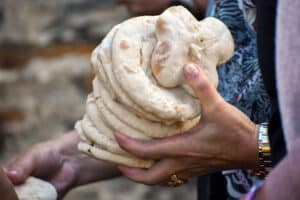
During Kvirikoba, the Shaliani Icon — a significant relic of Christ believed to have mystical and miraculous abilities — is lent to the church by the Mestia Ethnographic Museum where it is otherwise held. Believers come bearing sacred bread known as lemziri, along with jewelry and other monetary goods which they offer up at the altar amid shouted prayers and pleas for blessings. Many families also bring livestock raised specifically for the occasion that will be blessed and sacrificed later in the evening for the family to enjoy together. Take note of the enormous cauldron in the kitchen near the entrance to the church grounds — here, a bull that has been sacrificed at the start of the liturgy will boil throughout the festival before serving as part of a communal feast enjoyed by attendees in the evening.
While outsiders are allowed, it’s very important to respect the boundaries of Georgian hospitality and understand that this is a sacred day for the attendees. You’ll want to dress modestly, refrain from taking invasive photos, and maintain a respectful distance from the altar.
Mariamoba
In Georgian: მარიამობა (mariamoba)
August 28, 2026
Public holiday
(day off: August 28, 2026)
The Dormition of the Mother of God is celebrated throughout the Orthodox Christian World in memory of the “falling asleep,” or painless death, of the Blessed Virgin Mary, the mother of Jesus Christ, and her assumption into heaven. In Georgia, where over eighty percent of the population is Orthodox Christian, the Dormition of the Mother of God is recognized as a public holiday, popularly known as “Mariamoba,” or “Mary’s Feast Day.”
On August 28, churches across the country hold special services, and as the head of the Georgian Orthodox Church, Catholicos-Patriarch of All Georgia Ilia II gives a special liturgy. Georgian Christians end their two-week Dormition Fast from meat, fish, eggs, and dairy and celebrate with family and friends. Thousands attend church, light candles, and pray. Many parishioners travel to Gergeti Trinity Church, which acted as the national treasury in times of war and hardship.
Tbilisoba
In Georgian: თბილისობა (Tbilisoba)
The beginning of October, 2026
(not a public holiday – no day off – regional celebration)
Tbilisoba is a lively and vibrant festival that honors the food, culture, and history of Georgia with an emphasis on its capital city, Tbilisi. Taking place in Tbilisi, typically at the beginning of October, Tbilisoba also coincides with Georgia’s harvest season; wine and winemaking in general are huge parts of the festival.
Expect countless booths with proud vintners offer regional wine varieties and special grape stomping activities in traditional satsnakheli tubs. Beyond wine, Tbilisoba also celebrates all things Georgian food and culture, with folk dancing and singing galore and more traditional Georgian foods like mtsvadi, khachapuri, and churchkhela than any one person could ever manage.
Svetitskhovloba
In Georgian: სვეტიცხოვლობა (svetitskhovloba)
October 14, 2026
Public holiday
(day off: October 14, 2026)
Day of Svetitskhoveli Cathedral, also called Svetitskhovloba and Mtskhetoba, is a public holiday on October 14 celebrating the eponymous cathedral in the historic town of Mtskheta. Located about twelve miles outside the capital city of Tbilisi, the Svetitskhoveli Cathedral is the second-largest church in Georgia and is said to house the mantle of Christ.
Legend says that after a follower of Christ brought the mantle to Georgia, his sister became so overcome with emotion that she died upon touching the fabric. She was buried along with the mantle. It also said that Saint Nino performed a miracle upon a cedar tree that sprouted from the burial site, hence why the cathedral is called Svetitskhoveli, which means “The Living Pillar Cathedral” in Georgian. The cathedral was first constructed in the fourth century, rebuilt in the fifth century, and renovated in the 11th century by the architect Arsukidze.
The cathedral has served as the resting place of Georgian monarchs for centuries and has been listed as a UNESCO World Heritage Site since 1994. Today, the Georgian Orthodox commemorate Svetitskhovloba by traveling to Mtskheta for worship, feasting, and public walks. As the head of the Georgian Orthodox Church, Catholicos-Patriarch of All Georgia Ilia II performs a special liturgy at the cathedral. The city is filled with live music and traditional dancing, and artisan crafts line the streets.
Giorgoba
In Georgian: გიორგობა (giorgoba)
November 23, 2026
Public holiday
(days off: November 23, 2026)
Giorgoba commemorates the martyrdom of Saint George, the patron saint of knights, warriors, and the military and the protector of Georgia. On order of the Roman Emperor Diocletian, he was tortured and executed for converting to Christianity in 303 CE. He is often depicted battling a dragon, and his image appears upon the Georgian coat-of-arms.
Saint George maintained a close relationship with Saint Nino of Cappadocia, an early Christian whose missionary work inspired the conversion of Queen Nana and King Mirian III of Georgia. After his death, Saint Nino established a tradition of veneration for George.
Saint George has since become an icon in Georgian cultural, religious, and military history. Over three hundred churches in Georgia bear his name, and he is said to have often appeared to Georgian troops before battle over the centuries. Today, Georgian Orthodox Christians celebrate an otherwise somber occasion with feasting, live music, and traditional dancing.
You Might Also Like
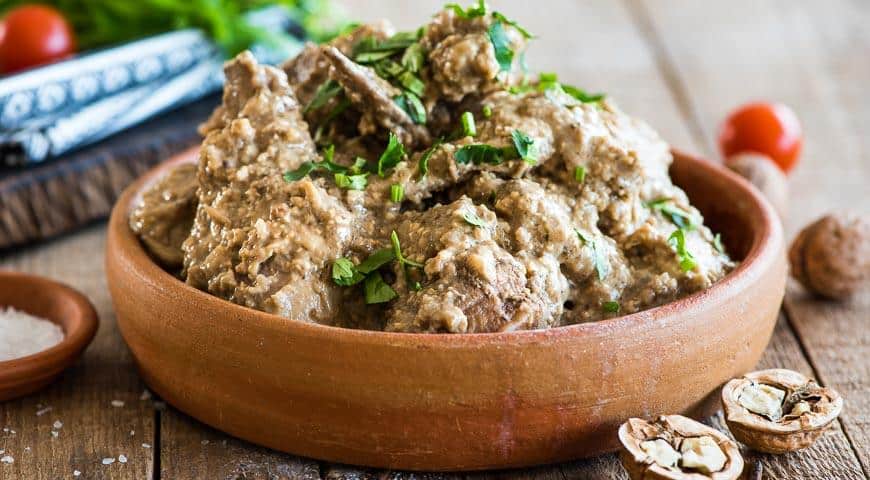
Satsivi: Georgian Poultry in Nut Sauce
Satsivi (საცივი) is a classic Georgian dish. The name refers specifically to a thick, aromatic sauce made of ground walnuts blended with garlic, onions, wine vinegar, and spices such as coriander, fenugreek, marigold, and cinnamon and/or cloves. The name is also applied to the dish created by simmering pieces of chicken or turkey in that […]

Mchadi: The Other Georgia’s Corn Bread
Mchadi (მჭადი) is a traditional Georgian cornbread. At its simplest, it is pan-fried cornmeal and water. Dense, slightly crisp on the outside, and crumbly inside, mchadi is best served as an accompaniment to richly flavored dishes, especially those with sauces to sop up. The etymology of mchadi comes from the Georgian verb chadna (ჩადნა), meaning […]
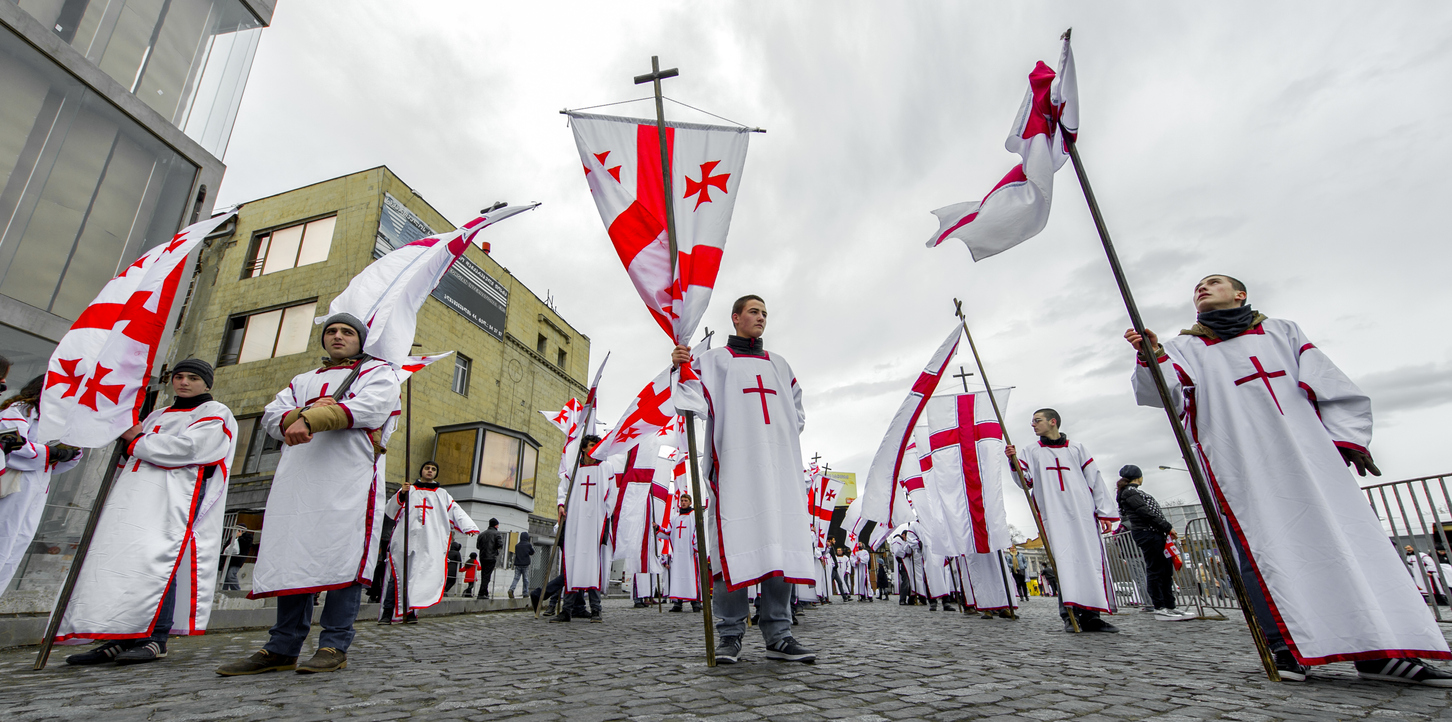
Georgian Holidays 2026: A Complete Guide
Georgian holidays strongly reflect the country’s unique traditions and its demographics. First, as more than 80% of Georgians identify with the Georgian Orthodox Church, the strong influence of the church can be felt in the preponderance of Orthodox holidays. Georgia also has several holidays celebrating its statehood and independence, which have been hard-won. We can […]
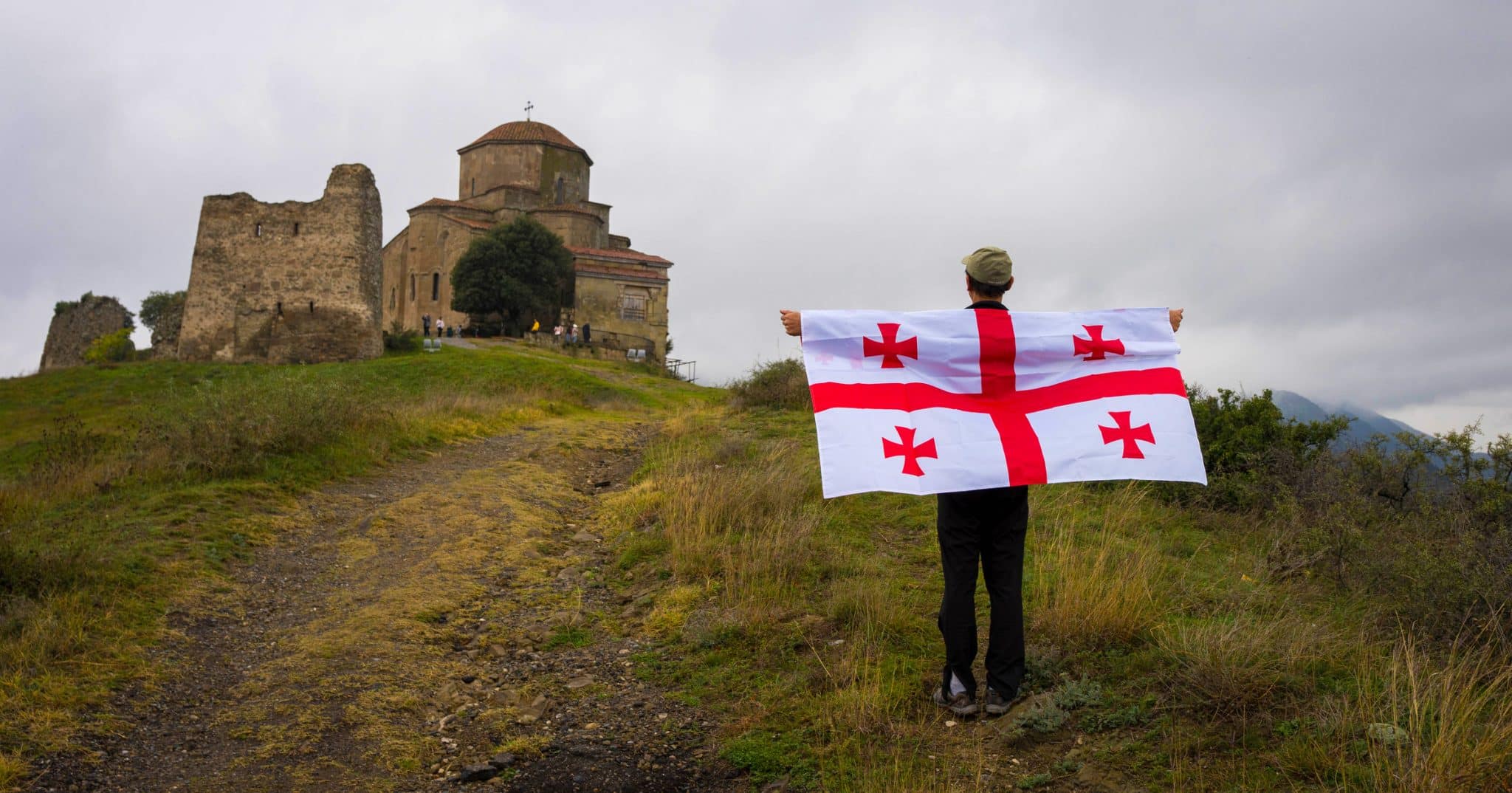
Georgia’s Story of Identity: Heroes, Memory, and Meaning
What shapes Georgian national identity? The answer is complex and personal, but one key element is the Georgian national narrative. This includes the heroes and pivotal events taught in schools, the places central to the nation’s collective memory, and the language and beliefs that frame its worldview. A national narrative goes beyond history: it is […]
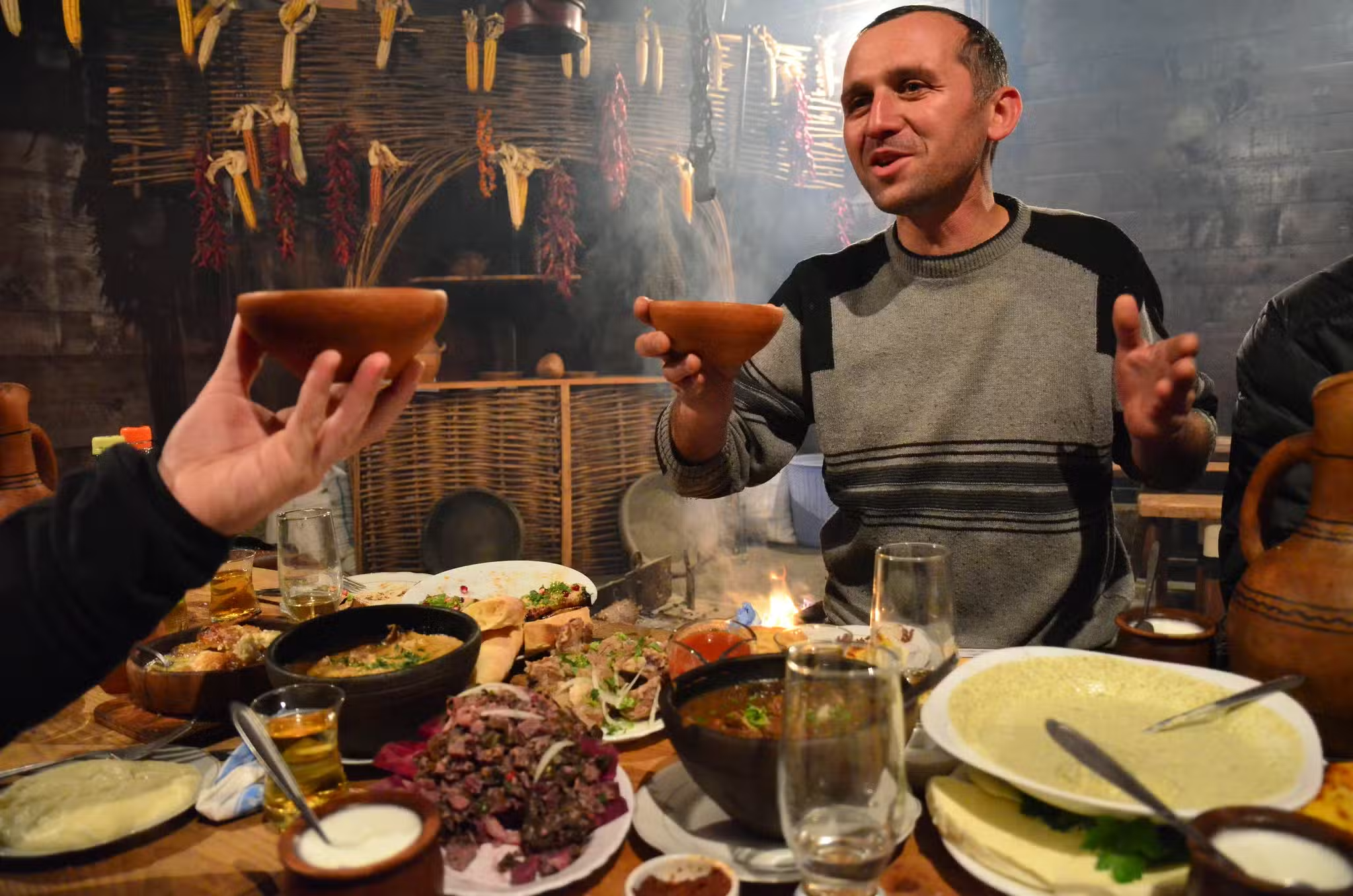
The Talking Georgian Phrasebook
The Talking Phrasebook Series presents useful phrases and words in side-by-side translation and with audio files specifically geared to help students work on listening skills and pronunciation. Each entry below, divided by category, features an English word or phrase in the left column and its Georgian translation in the right. The Georgian is presented in […]

